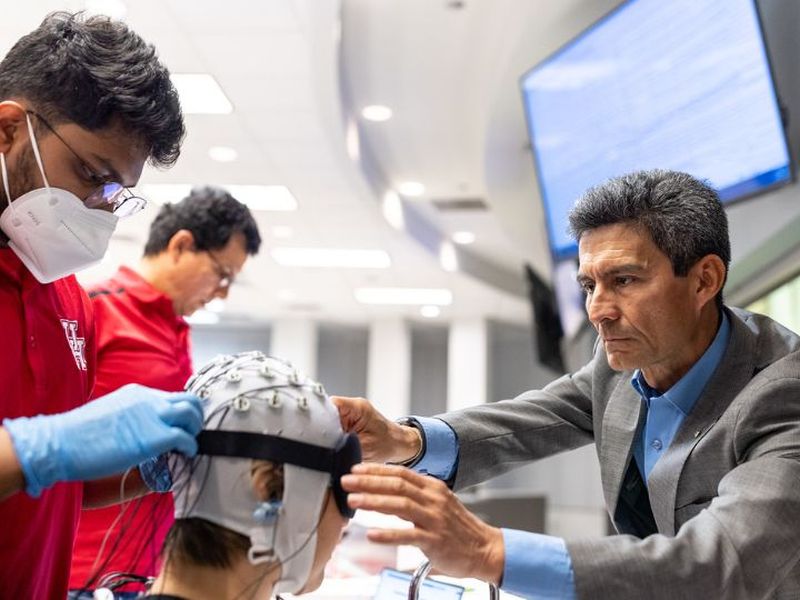International Hub for Neurotechnology Grows Again with Addition of West Virginia University and Georgia Tech
Two more universities, West Virginia University (WVU) and Georgia Institute of Technology, have been funded by the National Science Foundation and are set to join the Industry-University Cooperative Research Center for Building Reliable Advances and Innovations in Neurotechnology (IUCRC BRAIN), housed at the University of Houston. It is home base for scientists developing and testing the efficacy, safety and long-term reliability of patient-centered neurotechnology.
“Having WVU and Georgia Tech in BRAIN is a major milestone as they are top universities in the biomedical field. GT is No. 1 according to U.S. News & World Report. WVU is doing human subjects testing of implanted electrode arrays for brain-computer interfaces,” said Jose Luis Contreras-Vidal, the center director and Hugh Roy and Lillie Cranz Cullen Distinguished Professor of electrical and computer engineering.
Millions of adults live with neurological disorders, brain injury, mental illness, limb loss or paralysis, informing the dire need for accessible technologies that can more effectively address the care and rehabilitation needs of patients.
Enter the BRAIN Center, a collaboration between the University of Houston and Arizona State University, supported by the U.S. National Science Foundation. The center allows research that would not be possible within the traditional silos of academic, industry, regulatory and clinical communities.
And, sometimes, in the most creative way.
When you enter the center, you may see dancers or artists busy with pirouettes or paintbrushes while wearing brain caps to measure their neural activity.
“The NSF IUCRC BRAIN program is a terrific deal for young startup companies who wish to do proof-of-concept studies with an outstanding team of neural engineers and clinicians,” said Peter Konrad, MD, West Virginia University. “You can’t beat the cost of entry into an academic partnership with leading institutions in this space. There is a commitment to providing high value and significant reduction in overhead expenses.”
Since Phase 1 was initially funded by the NSF in 2017, international partners have joined as has the U.S. Food and Drug Administration, and the center has emerged as an international hub for developing neurotechnologies. The buzz continues to draw new members.
“Georgia Tech is very excited to join the BRAIN IUCRC with other leading neuroengineering institutions, all passionate about bringing faculty and students together with industry to collaborate on cutting-edge neurotechnology development,” said Michelle C. LaPlaca, Georgia Institute of Technology. “The Center partnerships are an excellent opportunity for small and large companies to invest in pre-translational research that both meets industry needs and harnesses academic expertise in order to ultimately improve patients’ lives.”
The multi-site IUCRC BRAIN Phase 2 is funded by a $1.8 million award from the National Science Foundation through Summer 2027 and an estimated $800,000 to $1 million per year in industry funds (not counting in-kind support) for the center.
Discoveries at the BRAIN Center include:
- Revolutionizing the way scientists and engineers approach the design of complex human-machine systems using data.
- Interpreting brain function from the molecular to the network levels.
- Harnessing neuroplasticity and emergent properties at multiple time scales to enhance the engagement and efficacy of human-machine interfaces.
- Enabling innovative devices that support accessible health care and empower individuals to control their own health, wellness, and fitness.
- Redefining the human-technology frontier.
“The BRAIN Center is a shining example of the NSF IUCRC program. Industry innovators, academic researchers and government agencies are collaborating to address challenging problems in neurotechnology. The BRAIN Center will be a source of transformative research work that has the potential to impact people with physical and neurological impairments,” said program director Mohan Kumar of the NSF.
According to the World Health Organization, every year around the world, between 250,000 and 500,000 people suffer a spinal cord injury and 15 million people suffer a stroke. Of these, 5 million die and another 5 million are left permanently disabled, placing a burden on family and community.
